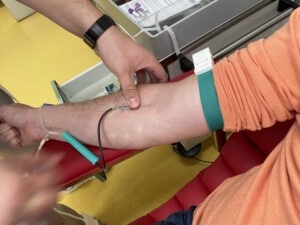
Colds and flu are a fact of life for kids, but there are smart steps you can take to help reduce their number of sick days.
What can you do to protect your child from the endless array of germs and viruses they encounter? Unfortunately, in some ways, getting sick is simply part of the child job description. “We all enter this world with an inexperienced immune system,” says Charles Shubin, M.D., an associate professor of pediatrics at the University of Maryland. Slowly, children prime their immunity by battling an ongoing series of germs, viruses, and other organisms—which is why many pediatricians consider six to eight colds, bouts of flu, or ear infections per year normal.
That said, some healthy habits can serve as an immune booster for kids, such as eating more vegetables, getting enough sleep, and washing your hands regularly. Here are seven ways to kick your kid’s immune system into high gear.
1. Serve more fruits and vegetables.
Carrots, green beans, oranges, strawberries: They all contain carotenoids, which are immunity-boosting phytonutrients, says William Sears, M.D., author of The Family Nutrition Book. Phytonutrients may increase the body’s production of infection-fighting white blood cells and interferon, an antibody that coats cell surfaces, blocking out viruses. Studies show that a diet rich in phytonutrients can also protect against such chronic diseases as cancer and heart disease in adulthood. Try to get your child to eat five servings of fruits and veggies per day.
2. Boost sleep time.
Studies of adults show that sleep deprivation can make you more susceptible to illness by reducing natural killer cells, immune-system weapons that attack microbes and cancer cells. The same holds true for children, says Kathi Kemper, M.D., director of the Center for Holistic Pediatric Education and Research at Children’s Hospital, in Boston. Children in daycare are particularly at risk for sleep deprivation because all the activity can make it difficult for them to nap.
So how much sleep do kids need? An infant may require up to 16 hours of crib time each day, toddlers should have 11 to 14 hours, and preschoolers need 10 to 13 hours. “If your child can’t or won’t take naps during the day, try to put her to bed earlier,” says Dr. Kemper.
3. Breastfeed your baby.
Breast milk contains turbo-charged immunity-enhancing antibodies and white blood cells. Nursing guards against ear infections, allergies, diarrhea, pneumonia, meningitis, urinary tract infections, and sudden infant death syndrome (SIDS). Studies show that it may also enhance your baby’s brain power and help protect them against insulin-dependent diabetes, Crohn’s disease, colitis, and certain forms of cancer later in life. Colostrum, the thin yellow “pre-milk” that flows from the breasts during the first few days after birth, is especially rich in disease-fighting antibodies, says Dr. Shubin.
The American Academy of Pediatrics recommends that moms exclusively breastfeed for the first six months of life. If this commitment isn’t realistic, aim to breastfeed for at least the first two to three months in order to supplement the immunity your baby received in utero. (That said, there’s nothing wrong with formula-feeding your infant instead!)
4. Exercise as a family.
Research shows that exercise increases the number of natural killer cells in adults—and regular activity can benefit kids in the same way, says Ranjit Chandra, M.D., a pediatric immunologist at the Memorial University of Newfoundland. To get your children into a lifelong fitness habit, be a good role model. “Exercise with them rather than just urge them to go outside and play,” says Renee Stucky, Ph.D., a clinical psychologist in Columbia, Missouri. Fun family activities include bike riding, hiking, inline skating, basketball, and tennis.
5. Guard against germ spread.
Fighting germs doesn’t technically boost immunity, but it’s a great way to reduce stress on your child’s immune system. Make sure your kids wash their hands often—and with soap. You should pay particular attention to their hygiene before and after each meal and after playing outside, handling pets, blowing their nose, using the bathroom, and arriving home from daycare. When you’re out, carry disposable wipes for quick cleanups. To help kids get into the hand-washing habit at home, let them pick out their own colorful hand towels and soap in fun shapes and scents.
Another key germ-busting strategy: “If your child does get sick, throw out her toothbrush right away,” says Barbara Rich, D.D.S., a spokesperson for the Academy of General Dentistry. A child can’t catch the same cold or flu virus twice, but the virus can hop from toothbrush to toothbrush, infecting other family members. If it’s a bacterial infection, such as strep throat, however, your child can reinfect themselves with the same germs that got them sick in the first place. In that case, tossing the toothbrush protects both your child and the rest of your family.
6. Banish secondhand smoke.
If you or your spouse smokes, then it’s best to quit. Cigarette smoke contains more than 7,000 harmful chemicals, many of which can irritate or kill cells in the body, says Beverly Kingsley, Ph.D., an epidemiologist with the Office on Smoking and Health at the Centers for Disease Control and Prevention, in Atlanta. Kids are more susceptible than adults to the harmful effects of secondhand smoke because they breathe at a faster rate; a child’s natural detoxification system is also less developed.
Secondhand smoke increases a child’s risk of SIDS, bronchitis, ear infections, and asthma. It may also affect intelligence and neurological development. If you absolutely can’t quit smoking, you can reduce your child’s health risks considerably by smoking only outside the house, Dr. Kingsley says.
7. Don’t pressure your pediatrician.
Urging your pediatrician to write a prescription for an antibiotic whenever your child has a cold, flu, or sore throat is a bad idea. Antibiotics treat only illnesses caused by bacteria, “but the majority of childhood illnesses are caused by viruses,” says Howard Bauchner, M.D., a professor of pediatrics and public health at the Boston University School of Medicine.
Studies show, however, that many pediatricians prescribe antibiotics somewhat reluctantly at the urging of parents who mistakenly think it can’t hurt. In fact, it can. Strains of antibiotic-resistant bacteria have flourished as a result, and a simple ear infection is more difficult to cure if it’s caused by stubborn bacteria that don’t respond to standard treatment. Whenever your child’s pediatrician wants to prescribe an antibiotic, make sure they aren’t prescribing it solely because she thinks you want it. “I strongly encourage parents to say, ‘Do you think it’s really necessary?’ ” Dr. Bauchner says.





















